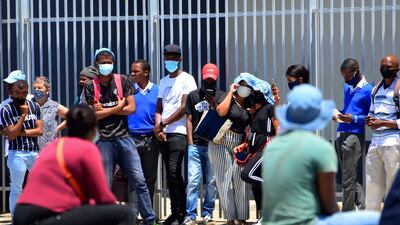The global economy will contract 4.3 per cent this year due to the Covid-19 crisis, while a viable vaccine will not halt the spread of the economic damage, UNCTAD, the United Nations trade and development body, said on Thursday.
The Geneva-based organisation said inequalities and vulnerabilities will worsen as the effects of the pandemic disrupt any progress made on poverty and other sustainable development goals. It also warned that the distribution of a viable vaccine is likely to expose long-entrenched inequalities in the global trading system.
“The Covid-19 pandemic has gravely wounded the world economy with serious consequences impacting all communities and individuals," said UNCTAD secretary-general Mukhisa Kituyi.
“Moving rapidly across borders, along the principal arteries of the global economy, the spread of the virus has benefited from the underlying interconnectedness – and frailties – of globalisation, catapulting a global health crisis into a global economic shock that has hit the most vulnerable the hardest.”
While developed economies are expected to be more affected in 2020 than developing countries, with their gross domestic product contracting 5.8 per cent versus 2.1 per cent, UNCTAD said the United Nations’ Sustainable Development Agenda 2030 will be derailed unless immediate policy actions are taken.
The recovery must also centre on renewed trade policies that tackle the twin challenge of market concentration and environmental impact, the report says, and global production networks must be more green, inclusive, and sustainable while simultaneously resetting the multilateral system, to support the most vulnerable and deliver on climate action.
Since the start of the outbreak in China last year, more than 1 million people have lost their lives, with uncertainty remaining about how and when the pandemic will run its course.
However, UNCTAD said the unprecedented economic shock generated by the global health emergency has already sharply exposed the global economy’s pre-existing weaknesses, severely setting back development progress around the world.
In 1990, the global poverty rate was 35.9 per cent before falling to 8.6 per cent by 2018. However, it has inched up to 8.8 per cent this year and will likely rise throughout 2021.
“Millions of jobs have already been lost, millions of livelihoods are at risk, and an estimated additional 130 million people will be living in extreme poverty if the crisis persists,” UNCTAD said.
The Covid disruption has had real and disproportionate consequences on vulnerable and disadvantaged low-income households, migrants, workers in the informal sector and, often, women, UNCTAD said, with those working in the tourism and microenterprise sectors particularly affected.
“Especially in the developing world, many of these populations are not protected by social safety nets and yet are particularly affected by soaring unemployment,” UNCTAD said.
The report said about 79.4 per cent of workers in sub-Saharan Africa and 84.5 per cent of workers in the world's least developed countries do not have access to any social protection or labour programmes.
The report calls for international assistance to be stepped-up with debt relief offered to poorer nations to give them the fiscal space needed to address the economic effects of the pandemic on their populations.
“Covid-19 has been painful and course-altering, but it is also a catalyst for needed change,” Mr Kituyi said. “We need to reshape global production networks and reset multilateral cooperation for the better.”
Global production networks must also play a critical role in producing and distributing the new vaccine to the most vulnerable, UNCTAD said, as they have in moving critical medical supplies during the crisis.
It warned that vaccine deployment will likely expose long-entrenched inequalities in the global trading system that must be changed to “recover better”.
“Now is the right time to address the weaknesses of globalisation that led to the rapid spread of the virus around the world and its uneven economic impacts,” Mr Kituyi said.


